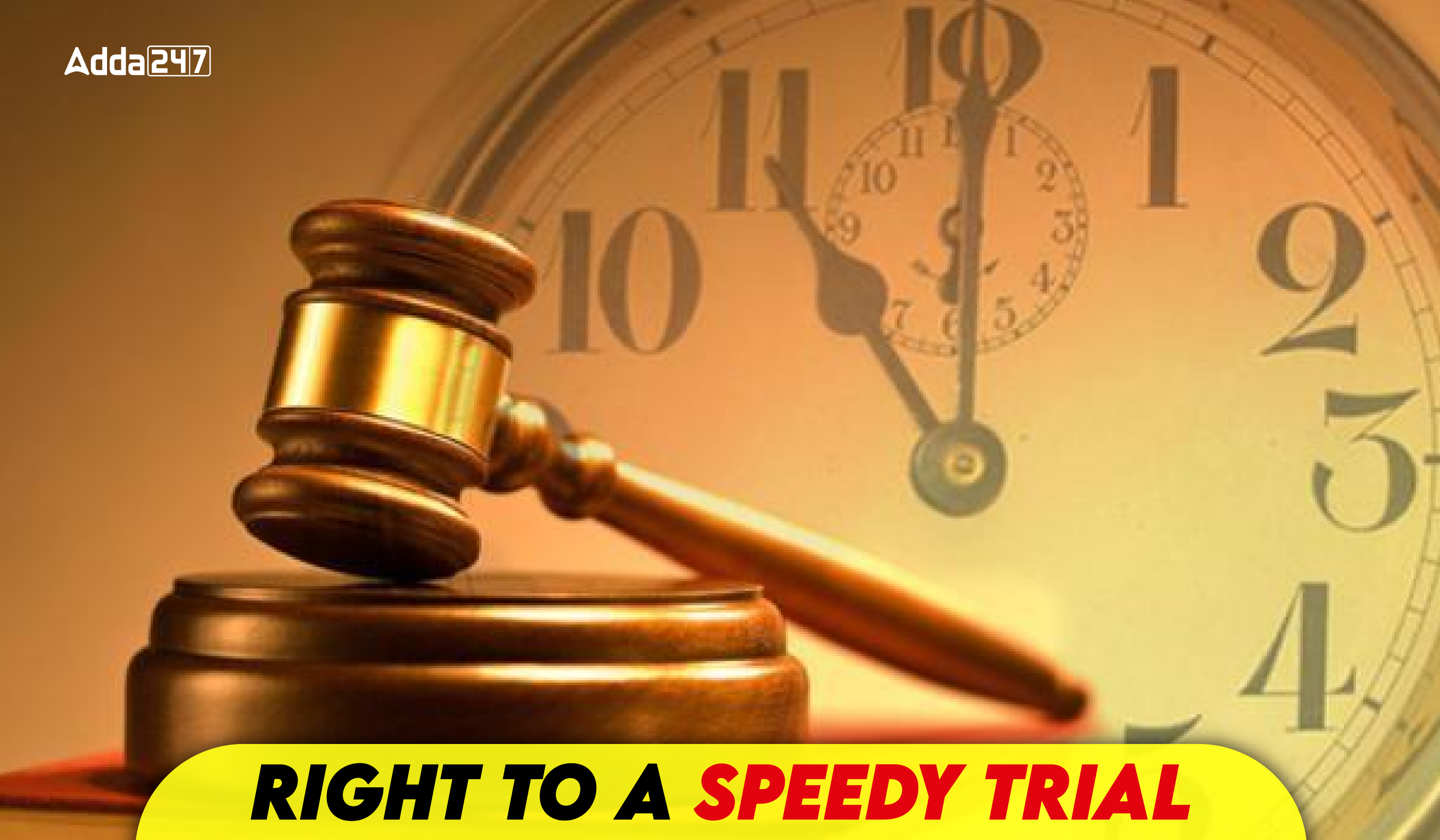Table of Contents
The administration of justice extends beyond convicting the guilty and acquitting the innocent. It encompasses the principles of fairness and expediency, ensuring that justice is delivered promptly. The need for a speedy trial is increasingly recognized as crucial to the integrity of the justice system. This right has been endorsed in various international Charters and Conventions and was notably ratified by India through the International Covenant on Civil and Political Rights (ICCPR) on April 10, 1979. This article delves into the concept of a speedy trial, its Constitutional foundations, legislative provisions, landmark case laws, and the need for judicial reforms in India.
Speedy Trial: Meaning
A Speedy trial is a Fundamental right ensuring that an accused person is brought to trial without undue delay. It is implicit in the broader interpretation of the right to life and personal liberty under Article 21 of the Indian Constitution. The principle behind a speedy trial is that justice delayed is justice denied. Without a speedy trial, the accused may suffer prolonged anxiety and public suspicion, while victims may feel that justice is indefinitely out of reach.
Speedy Trial: Legislative Provisions
The Code of Criminal Procedure (CrPC), 1973, includes several provisions designed to ensure a Speedy trial:
- Section 157(1): Mandates that upon receiving information of an offense, the police must immediately report it to the Magistrate and proceed with the investigation without delay.
- Section 173(1): Requires the investigation of offenses to be completed without unnecessary delay.
- Section 207: Ensures that the accused receives free copies of police reports, FIRs, witness statements, and other pertinent documents to prepare their defense promptly.
- Section 309: Stipulates that trials should be conducted on a day-to-day basis until the examination of all witnesses is complete. It specifically mandates that trials involving offenses under Sections 376 (and related provisions) of the IPC be completed within two months from the filing of the charge sheet.
- Section 468: Sets a limitation period for taking cognizance of certain offenses, thereby encouraging timely prosecution.
Constitutional Provisions
Article 21 of the Indian Constitution guarantees that no person shall be deprived of their life or personal liberty except according to the procedure established by law. This protection extends to ensuring a fair and speedy trial. The Supreme Court of India has, through various judgments, interpreted the right to a speedy trial as an intrinsic part of Article 21. In the landmark case of Maneka Gandhi v. Union of India, Justice Bhagwati emphasized that “the expression ‘personal liberty’ in Article 21 is of the widest amplitude” and includes the right to a speedy trial.
Speedy Trial: Landmark Case Laws
Several landmark judgments have highlighted the importance of a Speedy trial:
- Hussainara Khatoon v. State of Bihar (1979): This case involved a large number of undertrial prisoners who had been languishing in jail for years without trial. The Supreme Court recognized the right to a speedy trial as a Fundamental right under Article 21 and ordered the immediate release of these prisoners.
- Sheela Barse v. Union of India (1986): The Court held that the right to a speedy trial is violated if an accused is not tried promptly, leading to the quashing of the prosecution in the absence of any deliberate delay by the accused.
- Abdul Rehman Antulay v. R.S. Nayak (1992): The Supreme Court provided detailed guidelines for ensuring a speedy trial but refrained from setting a fixed timeframe for trial conclusion, recognizing the complexities of different cases.
- P. Ramachandra Rao v. State of Karnataka (2002): The Court laid down factors to assess whether the right to a speedy trial has been violated, such as the length of delay, reasons for the delay, and prejudice caused to the accused.
Speedy Trial: Challenges and Reforms
Despite these provisions and judicial pronouncements, the effective implementation of the right to a speedy trial remains challenging. Factors contributing to delays include the Judge-to-population ratio, procedural adjournments, and the backlog of cases.
Reformative measures include:
- Increasing the Judge-to-Population Ratio: Ensuring more Judges are appointed to handle the growing number of cases.
- Judicial Accountability: Encouraging timely judgments and reducing procedural adjournments.
- Alternative Dispute Resolution: Promoting Arbitration, Mediation, and Lok Adalats for quicker resolution of cases.
Conclusion
The right to a Speedy trial is fundamental to ensuring justice is served promptly and fairly. While the Indian judiciary has made significant strides in recognizing and upholding this right, the practical implementation requires continuous reforms. The Supreme Court has repeatedly emphasized the importance of a speedy trial, and it is now up to the legislative and executive branches, along with judicial reforms, to ensure this right is effectively realized for all citizens. Justice Krishna Iyer aptly remarked, “Speedy justice is a component of social justice since the community as a whole is concerned in the criminal being condignly and finally punished within a reasonable time and the innocent being absolved from the inordinate ordeal of criminal proceedings.”
Also Read: Irretrievable Breakdown of Marriage: India’s Legal Stand



 TSPSC Group 1 Question Paper 2024, Downl...
TSPSC Group 1 Question Paper 2024, Downl...
 TSPSC Group 1 Answer key 2024 Out, Downl...
TSPSC Group 1 Answer key 2024 Out, Downl...
 UPSC Prelims 2024 Question Paper, Downlo...
UPSC Prelims 2024 Question Paper, Downlo...





